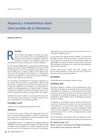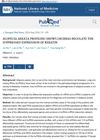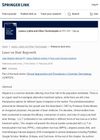3 citations,
April 2023 in “Dermatologica Sinica” PRP treatment may help with alopecia areata, especially in newer cases.
 4 citations,
September 2011 in “Expert Review of Dermatology”
4 citations,
September 2011 in “Expert Review of Dermatology” Various treatments exist for alopecia areata, but none are completely satisfactory; choice depends on age, disease extent, and preference.
 January 2019 in “International Journal of Trichology”
January 2019 in “International Journal of Trichology” A woman lost all her hair in one day, was diagnosed with a rare type of hair loss, and regrew it in 12 weeks with treatment.
 12 citations,
June 2020 in “Dermatology and therapy”
12 citations,
June 2020 in “Dermatology and therapy” Platelet-Rich Plasma (PRP) can promote new hair growth and increase hair density, but its effectiveness varies depending on the type of hair loss.
 6 citations,
May 2023 in “Drugs”
6 citations,
May 2023 in “Drugs” Baricitinib helps regrow hair in adults with severe alopecia better than a placebo and is approved for treatment, but long-term effects are still unknown.
 September 2012 in “Medicina estética/Medicina estética”
September 2012 in “Medicina estética/Medicina estética” More research is needed to confirm if laser therapy effectively treats hair loss.
November 2022 in “Frontiers in Medicine” PRP shows promise for treating mild alopecia areata but needs more research for cicatricial alopecias.
 May 2024 in “Journal of cosmetic dermatology”
May 2024 in “Journal of cosmetic dermatology” Tofacitinib is an effective and safe treatment for alopecia areata.
 12 citations,
September 2020 in “Journal of cosmetic dermatology”
12 citations,
September 2020 in “Journal of cosmetic dermatology” Trichoscopy is useful for diagnosing and monitoring alopecia areata treatment.
 September 2024 in “PubMed”
September 2024 in “PubMed” Certain RNAs may help diagnose alopecia areata by affecting keratin genes.
 January 2010 in “Elsevier eBooks”
January 2010 in “Elsevier eBooks” The document concludes that different types of hair loss have specific treatments, and early diagnosis is crucial for preventing permanent hair loss.
 16 citations,
November 2016 in “Journal of Cosmetic and Laser Therapy”
16 citations,
November 2016 in “Journal of Cosmetic and Laser Therapy” Laser and light therapies, especially the 308 nm excimer laser, are effective and safe for treating alopecia areata, but more research is needed.
 16 citations,
January 2015 in “Annals of Dermatology”
16 citations,
January 2015 in “Annals of Dermatology” The study found specific hair and scalp patterns for different types of hair loss in Koreans, noting racial differences affect diagnosis.
4 citations,
June 2023 in “Frontiers in immunology” JAK inhibitors help hair regrowth in alopecia areata but have a high risk of side effects.
 165 citations,
August 2013 in “Lasers in Surgery and Medicine”
165 citations,
August 2013 in “Lasers in Surgery and Medicine” Low-Level Laser Therapy is effective and safe for hair growth with minimal side effects.
 January 2018 in “Clinical approaches and procedures in cosmetic dermatology”
January 2018 in “Clinical approaches and procedures in cosmetic dermatology” Low-Level Laser Therapy might be an effective alternative hair loss treatment for some people.
 4 citations,
February 2014 in “Proceedings of SPIE”
4 citations,
February 2014 in “Proceedings of SPIE” Low-Level Light Therapy is effective for skin rejuvenation, wound healing, and hair growth, with mild side effects.
 2 citations,
June 2023 in “Indian journal of dermatology, venereology, and leprology”
2 citations,
June 2023 in “Indian journal of dermatology, venereology, and leprology” Janus kinase inhibitors can regrow hair in alopecia areata but may cause side effects and hair loss may return if treatment stops.
 18 citations,
March 2022 in “Drug design, development and therapy”
18 citations,
March 2022 in “Drug design, development and therapy” Platelet-rich plasma (PRP) may help with various hair loss types, but more research is needed to find the best use method.
 45 citations,
April 2019 in “International Immunology”
45 citations,
April 2019 in “International Immunology” The study concluded that immune cells attacking hair follicles cause hair loss in alopecia, with genetics and environment also playing a role, and highlighted the potential of certain treatments.
 1 citations,
April 2022 in “The Egyptian Journal of Hospital Medicine ”
1 citations,
April 2022 in “The Egyptian Journal of Hospital Medicine ” Fractional laser therapy may help regrow hair in alopecia areata.
 223 citations,
September 2018 in “Rheumatology”
223 citations,
September 2018 in “Rheumatology” JAK inhibitors are effective in treating various immune-related diseases, not just rheumatoid arthritis.
 40 citations,
August 2022 in “Frontiers in immunology”
40 citations,
August 2022 in “Frontiers in immunology” Blocking JAK/STAT pathways can help treat hair loss from alopecia areata.
 44 citations,
November 1998 in “Australasian Journal of Dermatology”
44 citations,
November 1998 in “Australasian Journal of Dermatology” Accurate diagnosis is key for treating different kinds of hair loss, and immune response variations may affect the condition and treatment results.
 January 2024 in “Dermatologic therapy”
January 2024 in “Dermatologic therapy” Tofacitinib is a safe treatment for hair loss in children, but long-term use may be needed for best results.
 April 2023 in “Medizinische Genetik”
April 2023 in “Medizinische Genetik” New research has found 14 genes linked to the risk of developing alopecia areata, improving understanding and treatment options.
 72 citations,
July 2014 in “American journal of clinical dermatology”
72 citations,
July 2014 in “American journal of clinical dermatology” Some treatments, like corticosteroids and sensitizing agents, can help with alopecia areata, but more high-quality research is needed.

Alopecia Areata is treated with drugs and therapies to reduce inflammation and immune response.
 89 citations,
March 2018 in “The Journal of Dermatology”
89 citations,
March 2018 in “The Journal of Dermatology” Trichoscopy helps diagnose and monitor alopecia areata by looking at a combination of specific hair and scalp features.
36 citations,
December 2021 in “The journal of allergy and clinical immunology/Journal of allergy and clinical immunology/The journal of allergy and clinical immunology” Two drugs, ritlecitinib and brepocitinib, improved scalp hair loss condition markers.

























